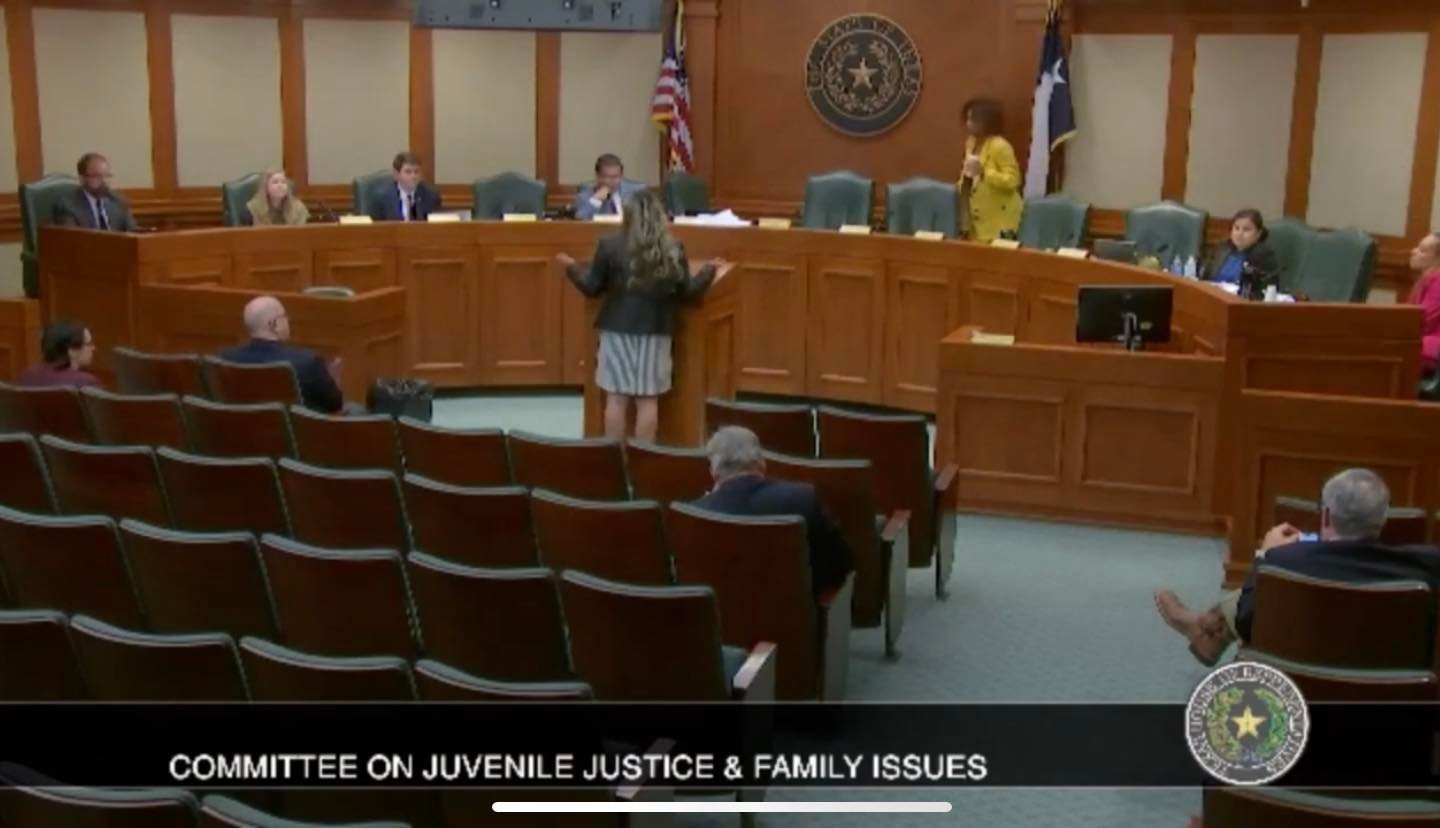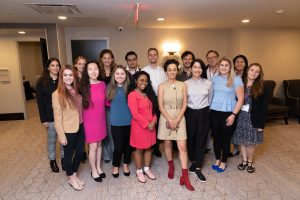Inspired by Ayaan Hirsi Ali, Natalie Arroyo joined AHA while still in college and just gave her first testimony against child marriage in Texas: “Being able to help protect girls from this abuse is incredibly rewarding and makes me feel inspired to do even more.”

Natalie Arroyo (center, at podium) giving testimony against child marriage in Texas, March 29, 2023. (Screenshot from the Texas House video player.)
Published 5/4/2023
When she first learned that female genital mutilation (FGM) and child marriage happen in the U.S., Natalie Arroyo was a student at Texas State University. She was saddened and angered and this propelled her to join AHA Foundation 5 years ago.
From her first job as an intern to her current role as a Marketing Manager, Natalie has helped share the stories of dozens of survivors on social media and the AHA website, helping them to break the silence and amplifying their activism to protect children. And just a few weeks ago, she herself was in the spotlight as the only person testifying in favor of a bill to close a child marriage loophole in the law in her home state of Texas.
We wanted to shine a light on her hard work and her dedication to defending the rights of children, particularly girls and women, in the U.S.—especially as she has recently become a mother and Mother’s Day is approaching.
AHA Foundation: How and when did you first learn about child marriage and FGM in the U.S.?
Natalie Arroyo: I first learned about the prevalence of FGM and child marriage through reading Ayaan’s [Ayaan Hirsi Ali, AHA Founder] 2007 memoir Infidel in about 2018. Ayaan’s own experience of undergoing FGM and forced marriage deeply moved me—and also angered me. How could such things happen in this day and age? I was sad to hear that so many women face these realities in conservative cultures across the world.
Infidel led me to look up AHA Foundation, and I was disturbed to find out how prevalent FGM and child marriage are right here in the U.S. They aren’t just problems in far-flung corners of the globe, but are happening right here, right now.
I knew I had to do something about this.
I was near the end of my Business Administration degree at Texas State University and I realized I could put it to good use with AHA. I applied to be a marketing intern at AHA in 2018 and have worked in various marketing roles and on the campus program since then.
I’m so happy to be able to use my creativity and passion to help women and girls suffering from FGM and child marriage in the U.S. This job allows me to realize my commitment to raise awareness of human rights abuses in the U.S. and to use my skills to educate people and empower them to take action.
AHA Foundation: How has your perspective on FGM and child marriage changed or deepened as you started communicating with survivors online and meeting some of them in person while working together to end these practices?
Natalie Arroyo: Reading about human rights abuses is one thing. Putting a face, and a name, and a story, and a PERSON to the word “survivor” is completely different and really impacted me emotionally. By listening to their stories, I feel like my eyes were opened.
Seeing the horrendous physical and mental consequences that I have read about for years manifested in person, right in front of me, really solidified my understanding of how survivors are reminded almost daily of their experiences because of the lingering side effects. I could see the impact of this practice on a real life person and it pushed me to care more about and speak out for these brave and strong women.
Knowing that many Americans are unaware of these practices made me feel bolder and more empowered to speak up about our work and to amplify the stories of the survivors I work with to educate others on the prevalence of FGM and child marriage in America.
“Working at AHA is more than just a job. I feel like I have a moral duty to help these women… When I see the bravery of survivors and activists, I feel empowered and inspired to fight even harder with and for them.”
AHA Foundation: Has getting to know these women affected the way you carry out your advocacy work?
Natalie Arroyo: I have interviewed many survivors of FGM and child marriage, like Jenny from Kentucky, Genevieve Meyers, and Naila Amin. This really brought home to me what these women are going through. I see the immense emotional labor they have to carry when telling their stories to me.
It makes me feel grateful that they feel they can open up to me and trust me to share their story. It also makes me impassioned to amplify their voices. Working at AHA is more than just a job. I feel like I have a moral duty to help these women. I don’t think I will ever not be able to share their experiences, especially when I hear someone minimizing what they have gone through. I hope that, by doing the leg work of educating and convincing others to take a stand against these abuses, I ease the burden of survivors who all too often have to relive their trauma through their activism.

Natalie (front, third from left) at AHA’s 2019 campus program summer training with Masih Alinejad (front, fourth from right).
When I see the bravery of survivors and activists, I feel empowered and inspired to fight even harder with and for them. For example, in 2019 I met Masih Alinejad at AHA’s campus fellowship summer training. Masih is a free speech advocate and a courageous Iranian dissident. She is fierce in her advocacy for the rights of Iranian women and despite many threats to her safety, she continues to use her platform to raise awareness about the fight for freedom in Iran. She makes me feel brave and empowered to speak up for those—and for all—women.
AHA Foundation: You recently testified in your home state of Texas on a bill to close a loophole allowing emancipated 16 and 17-year-olds to marry. What did that mean to you? How was the experience?
Natalie Arroyo: I was both honored and excited to be able to lend my voice to shed light on survivors’ experiences and clarify misconceptions for the House committee. I am not normally someone who volunteers to be in the spotlight so this experience was very different for me. I also had less than 24 hours to prepare, so it was a lot of pressure.
I was nervous but knew it was an important part of our work. And it had also taken on a whole new dimension for me personally. Last year, I became a mother and this only deepened my commitment to ending abuses against children. I can’t imagine my child going through the same things that so many survivors have. Having a child of my own brings it that much closer to home for me, and only inspires me to fight even harder.
I ended up being the only person there to testify in support of the bill. Being able to help protect girls from this abuse was incredibly rewarding and makes me feel inspired to do even more.
WATCH: Natalie’s Texas Testimony
READ MORE: Jenny’s story
READ MORE: Genevieve Meyers’s story
READ MORE: Naila Amin’s story

